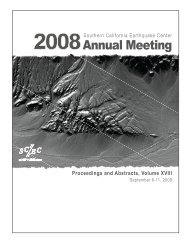Annual Meeting - SCEC.org
Annual Meeting - SCEC.org
Annual Meeting - SCEC.org
Create successful ePaper yourself
Turn your PDF publications into a flip-book with our unique Google optimized e-Paper software.
<strong>SCEC</strong> Advisory Council | Report<br />
After some general introductory remarks, we provide input on these issues raised by the Director. We also comment on some<br />
topics raised by the AC--some are new and some are recurring:<br />
• Increasing the visibility of workshops within <strong>SCEC</strong> and awareness of their outcomes<br />
• Input on the effectiveness of annual meeting sessions for science planning<br />
• Reflections on the size of the annual meeting<br />
Finally, we note that in this year’s AC report we include some recommendations for the USGS in areas where their<br />
programmatic interests strongly overlap with those of <strong>SCEC</strong>.<br />
Some General Impressions<br />
Congratulations are in order on multiple fronts. Foremost, at the 2010 meeting we celebrated <strong>SCEC</strong>’s 20th anniversary and<br />
were thrilled to learn that both the USGS and NSF have agreed to fund <strong>SCEC</strong>4. We applaud the herculean scientific planning<br />
and proposal writing effort produced an on time submittal despite the occurrence of the M7 Haiti earthquake in January and<br />
the M9.2 Chile earthquake just days before the deadline. By all accounts the June site visit to <strong>SCEC</strong> by both USGS and NSR<br />
review panels was extremely well <strong>org</strong>anized and succeeded in portraying the many facets of <strong>SCEC</strong> and hence was critical in<br />
assuring the continued funding.<br />
We also applaud the <strong>SCEC</strong> CEO’s initiative in building a statewide coalition of regional earthquake alliances that helped plan<br />
and promote an all-California ShakeOut drill in October 2010 which engaged more than 7.9 million state residents. In addition,<br />
the Earthquake Country Alliance, under Mark Benthien’s able leadership, is actively exporting the ShakeOut exercise to both<br />
other regions of the U. S. and to at least one international site, New Zealand. We view the ShakeOut exercise as a unique<br />
scientific leadership and effective outreach outcome that was only possible as a result of the shared vision, the stature, strong<br />
participatory spirit, and integrative <strong>org</strong>anization of <strong>SCEC</strong> as a dedicated science center.<br />
We also want to strongly commend the outstanding, on-going commitment to involving undergrads in <strong>SCEC</strong> research<br />
through intern programs under the leadership of Bob de Groot. The enthusiasm, breadth and diversity of the outstanding<br />
undergrads getting an opportunity to participate directly in earth science research are inspiring. The entire <strong>SCEC</strong> community<br />
benefits from energy and stimulation these students bring to the <strong>Annual</strong> <strong>Meeting</strong> through their participation and presentation<br />
posters on their work.<br />
All these CEO efforts were all highlighted in a very positive review of the effectiveness of the CEO program conducted by an<br />
independent review panel in the fall of 2009. The review panel’s report was included in the <strong>SCEC</strong>4 proposal.<br />
Since members of the Advisory Council are not members of <strong>SCEC</strong>, the <strong>Annual</strong> <strong>Meeting</strong> provides an important opportunity for<br />
Council members to assess the community’s annual progress on the Center’s goals and programs. The 2010 meeting and<br />
associated workshops proved again to be impressive demonstrations of the energy and enthusiasm of the <strong>SCEC</strong> community.<br />
The 160 registrants who were attending their first <strong>SCEC</strong> <strong>Annual</strong> <strong>Meeting</strong> (nearly 30% of the 545 total registrants), including<br />
many students and interns, provided heartening evidence of the center’s growing participation and its compelling mission.<br />
The Advisory Council also lauds the entire <strong>SCEC</strong> membership for its persistently selfless community spirit which enables<br />
considerable progress in developing communal, system-level models and representations that are advancing the goals of both<br />
fundamental and applied earthquake system science. In particular, we would like to recognize Deputy Director Greg Beroza’s<br />
superb leadership of the science collaboration process. Beroza’s kickoff keynote on <strong>SCEC</strong> scientific accomplishment did a<br />
superb job of highlighting breakthrough science and the progress made towards <strong>SCEC</strong>3 goals.<br />
Finally, the Advisory Council would like to particularly acknowledge Tom Jordan’s exemplary leadership of <strong>SCEC</strong> over the<br />
past 10 years. Tom arrived in 2000 and brought an infusion of energy and creative ideas to <strong>SCEC</strong> as it went into its <strong>SCEC</strong>2<br />
planning process. Under his direction the <strong>SCEC</strong>2 proposal was funded and numerous new research directions were launched.<br />
Tom’s vision and ability to cultivate and seize funding opportunities outside of the core support has brought new perspectives,<br />
expertise and tools to address earthquake system science. Under Tom’s initiative and leadership, <strong>SCEC</strong> now leads the<br />
earthquake science community in active engagement of the high performance computing community. The California<br />
Earthquake Authority was so impressed with the joint <strong>SCEC</strong>-USGS-CGS’ UCERF2 uniform statewide assessment of<br />
earthquake likelihood analysis that they have funded a UCERF3 proposal to address a number of key issues and uncertainties<br />
leading to an improved assessment.<br />
2011 <strong>SCEC</strong> <strong>Annual</strong> <strong>Meeting</strong> | 23



